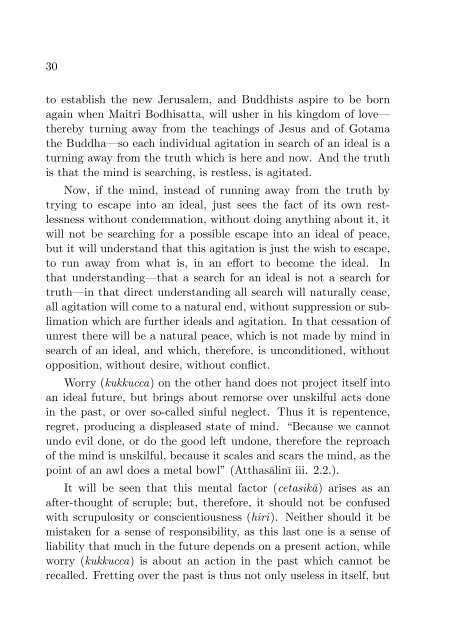Agony and Ecstasy
A comparative study of the five hindrances, together with the five states of concentration or mental absorption.
A comparative study of the five hindrances, together with the five states of concentration or mental absorption.
You also want an ePaper? Increase the reach of your titles
YUMPU automatically turns print PDFs into web optimized ePapers that Google loves.
30<br />
to establish the new Jerusalem, <strong>and</strong> Buddhists aspire to be born<br />
again when Maitri Bodhisatta, will usher in his kingdom of love—<br />
thereby turning away from the teachings of Jesus <strong>and</strong> of Gotama<br />
the Buddha—so each individual agitation in search of an ideal is a<br />
turning away from the truth which is here <strong>and</strong> now. And the truth<br />
is that the mind is searching, is restless, is agitated.<br />
Now, if the mind, instead of running away from the truth by<br />
trying to escape into an ideal, just sees the fact of its own restlessness<br />
without condemnation, without doing anything about it, it<br />
will not be searching for a possible escape into an ideal of peace,<br />
but it will underst<strong>and</strong> that this agitation is just the wish to escape,<br />
to run away from what is, in an effort to become the ideal. In<br />
that underst<strong>and</strong>ing—that a search for an ideal is not a search for<br />
truth—in that direct underst<strong>and</strong>ing all search will naturally cease,<br />
all agitation will come to a natural end, without suppression or sublimation<br />
which are further ideals <strong>and</strong> agitation. In that cessation of<br />
unrest there will be a natural peace, which is not made by mind in<br />
search of an ideal, <strong>and</strong> which, therefore, is unconditioned, without<br />
opposition, without desire, without conflict.<br />
Worry (kukkucca) on the other h<strong>and</strong> does not project itself into<br />
an ideal future, but brings about remorse over unskilful acts done<br />
in the past, or over so-called sinful neglect. Thus it is repentence,<br />
regret, producing a displeased state of mind. “Because we cannot<br />
undo evil done, or do the good left undone, therefore the reproach<br />
of the mind is unskilful, because it scales <strong>and</strong> scars the mind, as the<br />
point of an awl does a metal bowl” (Atthasālinī iii. 2.2.).<br />
It will be seen that this mental factor (cetasikā) arises as an<br />
after-thought of scruple; but, therefore, it should not be confused<br />
with scrupulosity or conscientiousness (hiri). Neither should it be<br />
mistaken for a sense of responsibility, as this last one is a sense of<br />
liability that much in the future depends on a present action, while<br />
worry (kukkucca) is about an action in the past which cannot be<br />
recalled. Fretting over the past is thus not only useless in itself, but

















